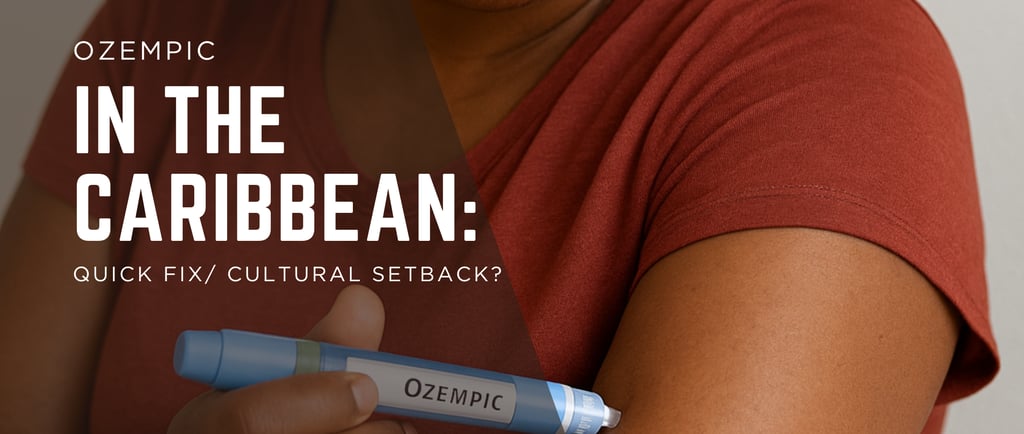Ozempic in the Caribbean: Quick Fix or Cultural Setback?
Curious about Ozempic and its role in managing weight and diabetes? While it’s shown clinical benefits for type 2 diabetes and obesity, there are important considerations cost, accessibility, cultural acceptance, and potential side effects that every Caribbean community member should know. I break down what WHO and CDC say, the pros and cons, and why relying solely on medication isn’t always the answer. Knowledge is power, let’s make informed health choices together!
NUTRITION AND MEDICATION INTERACTIONS
Iola Prieto
9/6/20255 min read


The Question That Sparked It All
At a recent health fair, someone pulled me aside, eyes wide with urgency, and asked:
“Miss, do you think I should take Ozempic?”
Without hesitation, I said no. But that wasn’t the end of the conversation. In fact, that one question became a window into a bigger issue we need to talk about, our increasing reliance on medication as a quick fix, especially in communities like ours across the Caribbean and within the Black diaspora.
So, let’s unpack this. What exactly is Ozempic? Why is it trending? Are there any benefits at all? And most importantly, what are the hidden costs for us, culturally and physically, if we turn to it instead of sustainable health practices?
What is Ozempic?
Ozempic (generic name: semaglutide) is a prescription medication originally developed for people living with type 2 diabetes. It’s a GLP-1 receptor agonist, meaning it mimics a natural hormone (GLP-1) that helps regulate blood sugar by stimulating insulin release, slowing digestion, and reducing appetite.
But here’s the twist: beyond blood sugar control, doctors and celebrities began noticing significant weight loss in patients taking it. Cue the global frenzy. Social media blew up, pharmacies sold out, and suddenly “Ozempic” became a buzzword not for managing diabetes, but for fitting into smaller jeans.
The Pros (If We Must Call Them That)
Let’s be fair, there are a few potential upsides:
Blood Sugar Regulation
For people with type 2 diabetes, Ozempic helps stabilize blood glucose levels, which can reduce the risk of long-term complications like kidney damage, vision loss, or nerve damage.
Weight Loss
Some individuals do lose significant weight (5–15% of body weight) while on Ozempic. In a medical setting, this may help reduce obesity-related risks.
Reduced Cardiovascular Events (in high-risk groups)
Clinical trials show potential in lowering the risk of stroke or heart attack in people with type 2 diabetes and pre-existing cardiovascular conditions.
Those are the “pros.” But here’s the reality: the same outcomes, blood sugar balance, weight loss, improved heart health, can also be achieved through dietary changes, physical activity, stress management, and cultural food adaptations. And unlike Ozempic, those lifestyle interventions build habits that last beyond a prescription.
The Cons: Where the Story Gets Real
This is where I lean in and tell people the truth, especially in the Caribbean context:
Ozempic comes with strings attached. Big ones!
Side Effects That Disrupt Daily Life
Nausea, vomiting, diarrhea, constipation, stomach pain, these are not small inconveniences. For some, they’re debilitating. Imagine trying to train for a triathlon, go to work, or even just enjoy Sunday lunch with family while battling stomach cramps.
Nutrient Absorption Issues
Because it slows digestion, some people may absorb fewer nutrients. In populations already battling iron deficiency, vitamin D deficiency, or anemia (very common in Caribbean and Black communities), this could make health problems worse.
Dependency and the “Forever Drug” Problem
Here’s the kicker: most people regain weight when they stop taking Ozempic. Why? Because it doesn’t rewire habits, it just suppresses appetite. Stop the drug, the appetite returns. Which means for many, it becomes a lifelong prescription.
Cultural Clash with Caribbean Food Systems
Our food is more than fuel, it’s identity. Pelau, callaloo, roti, ground provisions, saltfish. If you’re suppressing appetite or constantly nauseous, food becomes the enemy instead of a source of community and heritage. That disconnect may erode cultural practices and increase feelings of isolation.
Equity and Accessibility
Ozempic is expensive. In some Caribbean islands, one month’s supply can cost more than half of a family’s grocery budget. This widens the gap between those who can afford “medical quick fixes” and those left with the stigma of being overweight or diabetic without access to “solutions.”
Lack of Research in Black & Caribbean Populations
Clinical trials often underrepresent Black people and Caribbean communities. That means we don’t fully know how genetics, cultural diets, and unique risk factors (like higher rates of hypertension and metabolic syndrome) interact with Ozempic long-term.
The Mental Health Trap
Using medication as a shortcut to weight loss can reinforce harmful body image issues. Instead of teaching sustainable approaches, it feeds the cycle of dependency, shame, and quick-fix thinking—especially dangerous among our youth watching TikTok “before and after” trends.
So, Why Did I Say No?
Because when we look beyond the glossy marketing, Ozempic is not a solution it’s a Band-Aid.
In the Caribbean, we don’t need more Band-Aids. We need root cause healing:
Better education on how to fuel our bodies with the foods already in our culture.
Support systems for physical activity that are accessible to all.
Policies that make fresh, local foods more affordable than imported, ultra-processed products.
Community-driven programs that shift our relationship with food from “problem” to “power.”
Ozempic won’t give us that. Lifestyle and nutrition, done with cultural relevance, will.
A Caribbean Perspective on Sustainable Alternatives
Instead of Ozempic, here are proven, accessible, culturally aligned strategies:
Plant-Based Caribbean Staples
Green bananas, dasheen, breadfruit, lentils, and pigeon peas provide fiber and slow-digesting carbs that regulate blood sugar naturally.
Local Herbs & Teas
Cerasee, moringa, turmeric, and hibiscus (sorrel) have been used for generations to support digestion, blood sugar, and inflammation.
Movement as Culture
Dance, cricket, football, swimming, even “walking to the market.” These forms of activity are built into our heritage and can replace the gym for those who can’t afford memberships.
Community Eating Practices
Sunday family meals and communal cooking can be leveraged to reinforce balanced plates, portion control, and healthy cultural recipes.
Final Word: Beyond the Hype
At the health fair, I could see the hope in that person’s eyes when they asked about Ozempic. They weren’t just asking about a drug, they were asking for an easier way, a lifeline. And I don’t blame them. Managing weight, diabetes, and cultural pressures is hard.
But my answer “No, not Ozempic” wasn’t about denying them hope. It was about redirecting them to real hope. The kind that doesn’t run out when the prescription ends. The kind that celebrates who we are, what we eat, and how we move as Caribbean people.
Because in the end, pills and injections may shrink your appetite but only lifestyle, culture, and conscious nutrition will expand your life.
To delve deeper into the intersection of Ozempic use, cultural beliefs, and healthcare in the Caribbean, consider exploring the following academic resources:
CDC Data Brief on GLP-1 Injectable Use Among Adults with Diagnosed Diabetes: This report presents data on the prevalence and trends of GLP-1 injectable use among adults with diagnosed diabetes in the United States. CDC
Culturally Sensitive Health Education in the Caribbean: This review identifies educational strategies that can effectively address diabetes, diet, and physical activity levels in the Caribbean diaspora population, emphasizing the importance of culturally tailored health interventions MDPI.
Health Beliefs of African Caribbean People with Type 2 Diabetes: This study explores how cultural beliefs influence the management of diabetes within African Caribbean communities, providing insights into the potential reception of treatments like Ozempic PMC.
Ozempic, Culture, and Trust in Minority Communities: This article examines the cultural dynamics and trust issues surrounding Ozempic use in minority communities, focusing on Black and Latinx perspectives, which may offer parallels to Caribbean contexts Jembe.
WHO Evaluation of GLP-1 Receptor Agonists for Obesity Management: This document provides a comprehensive review of the clinical evidence, cost-effectiveness, and policy considerations related to the use of semaglutide in obesity management. World Health Organization
